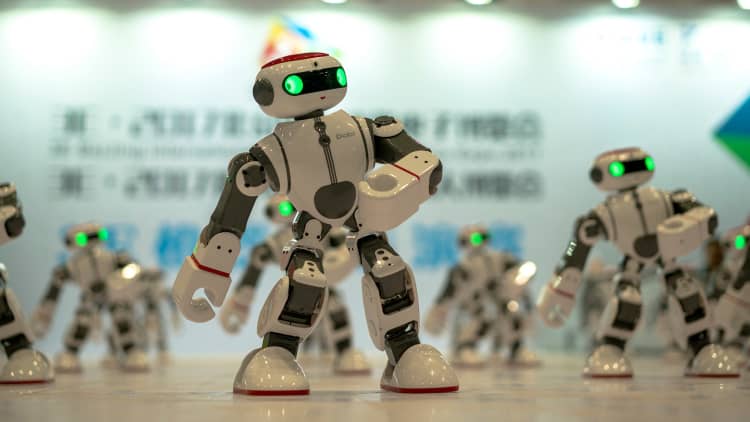
Artificial intelligence, machine learning and robotics are making some real money for stock investors, and beating the market.
The Global X Robotics and Artificial Intelligence ETF (BOTZ) is up 30 percent this year and the ROBO Global Robotics and Automation Index (ROBO) is up 25 percent. That's roughly three times the Dow Jones industrial average's 9 percent rise and twice the 's 11 percent climb.
"Between the tech exposure and the international exposure, that's helped the group pretty well," said Jack Ablin, chief investment officer at BMO Private Bank. "Certainly thematically it's in a sweet spot."
The upward trend in robotics and artificial intelligence stocks is one proponents say, in the long-term, could top the so-called FANG stocks — Facebook, Amazon.com, Netflix and Google parent Alphabet. Each FANG stock has rallied 20 to 50 percent this year and the companies are increasingly focused on using technologies such as artificial intelligence, or AI, to develop their businesses.
"In our opinion, robotics, automation, AI — [RAAI] is really the next FANG trade if you will," William Studebaker, president and CIO at Robo Global, told CNBC.
"All the FANG companies are really redefining their business as AI first and they're investing" in these companies, Studebaker said. "We're selling the tech they're using to enable their business."
Relative performance of ROBO and BOTZ to the S&P 500 (year to date)
Source: FactSet
The tech-heavy Nasdaq composite has soared 19 percent in 2017 to hit a record high this week. More than half of the S&P 500's technology sector sales come from overseas, where economic growth has largely picked up more than in the U.S.
Many of the robotics or machine learning-focused companies in the BOTZ and ROBO ETFs are not based in the U.S., helping explain some of the funds' outperformance.
For BOTZ, Japanese companies compose nearly half of the 29-stock fund, followed by the U.S. and Switzerland, according to its fact sheet. More than half of ROBO's stocks are based outside North America.
The top 10 holdings of BOTZ include Intuitive Surgical, which received a $1,000 price target from Goldman Sachs in May, Mitsubishi Electric, Nvidia and Keyence. ROBO's major holdings include Swiss-based industrial company Abb, Chinese industrial name HollySys and U.S. health care company Accuray, according to a fact sheet.
"Many of these companies are not followed by Wall Street or underfollowed by Wall Street," Studebaker said. "This is an industry that's evolving and so it's going to explode."
Investors are starting to get interested as well. Studebaker said ROBO added $1 billion in assets under management over the last 12 months, while Global X said BOTZ's assets under management leaped from $1.5 million at its launch in September 2016 to $236 million Monday.
That jump in assets under management makes BOTZ the youngest fund in Global X's top 10 largest funds, according to Jay Jacobs, director of research and vice president at Global X Funds. "It's really hitting this inflection point," he said.
Increased focus on artificial intelligence is already showing up in the tech giants' earnings calls.
Google parent Alphabet reported better-than-expected second-quarter results after the close Monday. Its shares fell Tuesday on worries that rising traffic acquisition costs will hit future profit growth, but UBS analyst Eric Sheridan wrote in a Monday report that he still holds a long-term constructive view on Alphabet given its focus on artificial intelligence and machine learning.
Alphabet's earnings call was also the third straight quarter in which Google CEO Sundar Pichai mentioned artificial intelligence, Gene Munster, once a prominent Apple analyst, pointed out Tuesday.
"Google is betting on the right long-term trends (Google, AI, AR, VR)," Munster said in a note from his new firm Loup Ventures, a venture capital firm focused on artificial intelligence, robotics, virtual reality and augmented reality.
Facebook is scheduled to report quarterly earnings Wednesday, and Amazon.com on Thursday.
Netflix CEO Reed Hastings said on the video streaming company's earnings call last week that the company uses algorithms for personalization.
To be sure, since terms like artificial intelligence and robotics have become buzzwords, investors will need to do their research to determine leaders in the industry,
The number of U.S. corporate earnings call transcripts mentioning the words jumped to 124 last quarter, up from 107 in the first quarter and 50 in the second quarter of 2016, according to a search using AlphaSense. The analysis covered U.S. companies with more than $2 billion in market capitalization.
"In the tech boom," BMO's Ablin said, "random companies would put 'dotcom' at the end of their name just to prove they're different."
— CNBC's Tae Kim contributed to this report.


